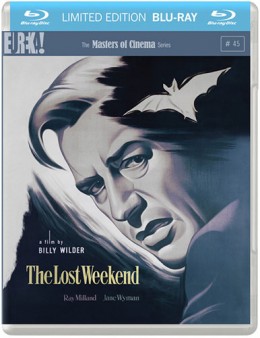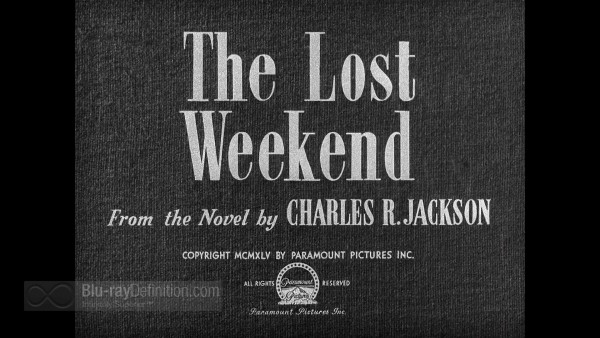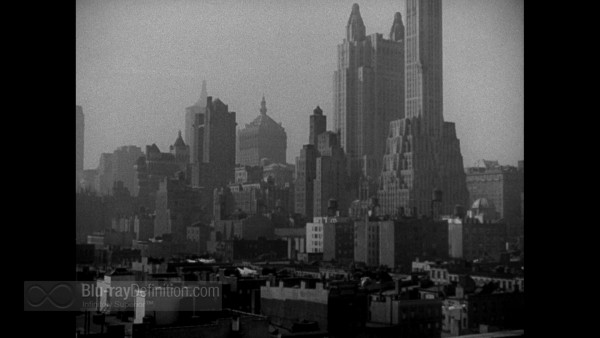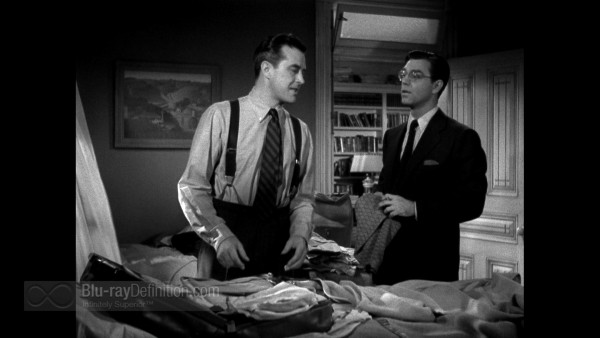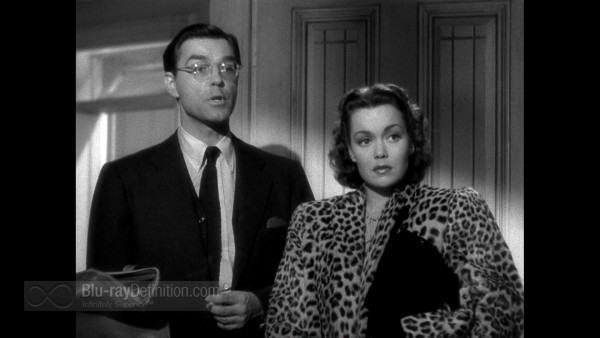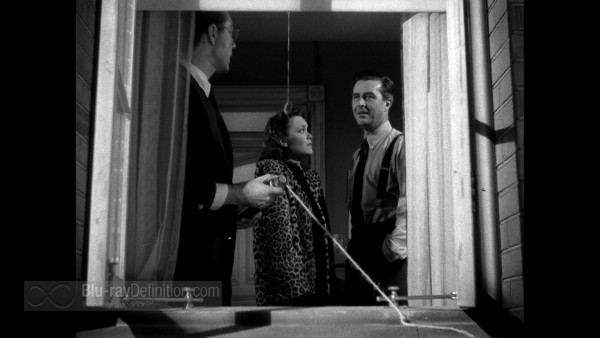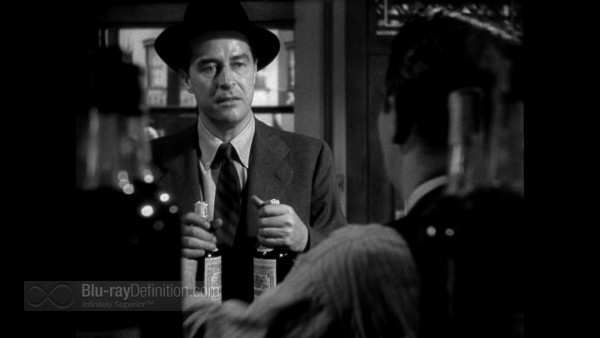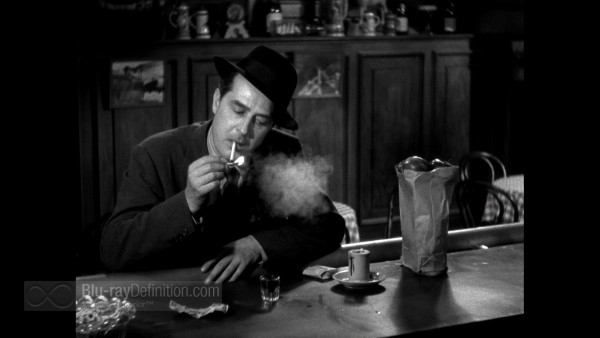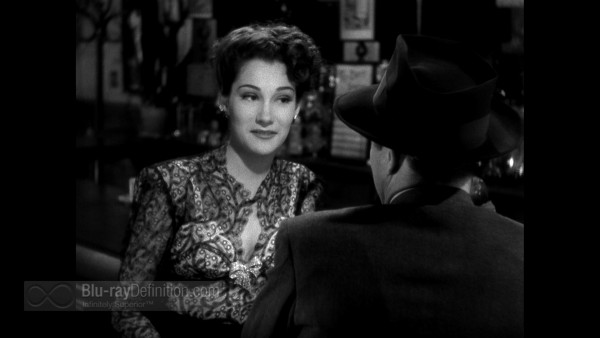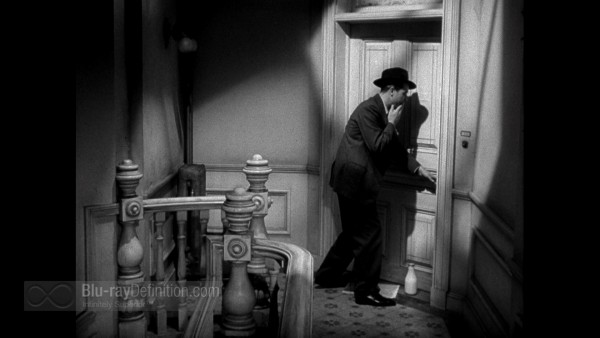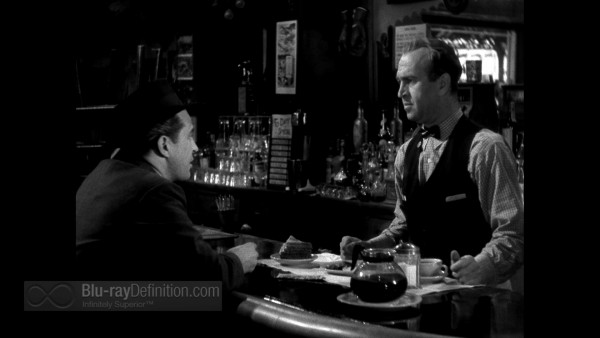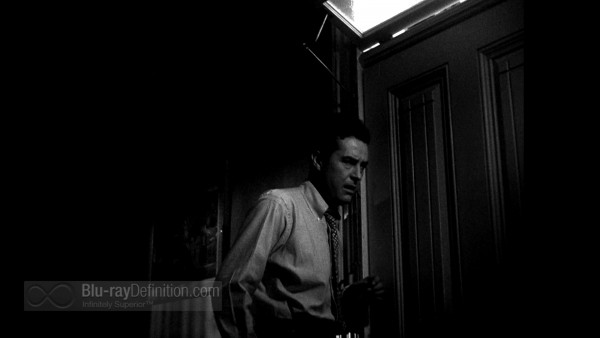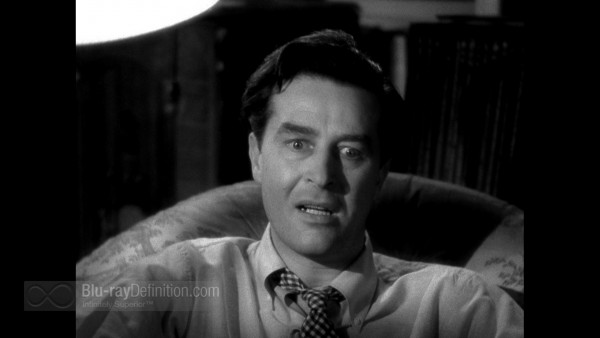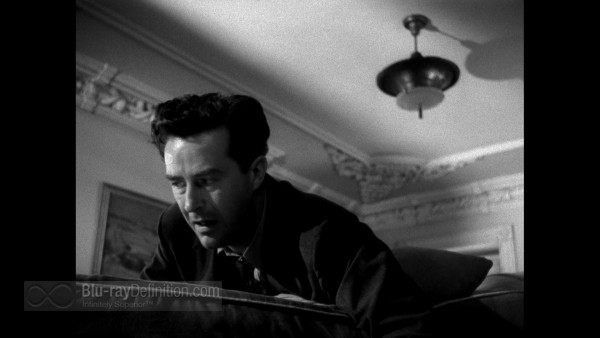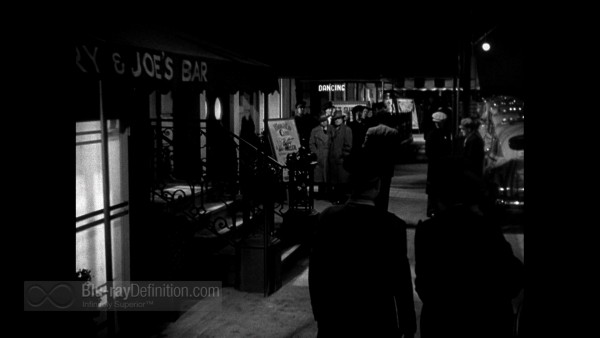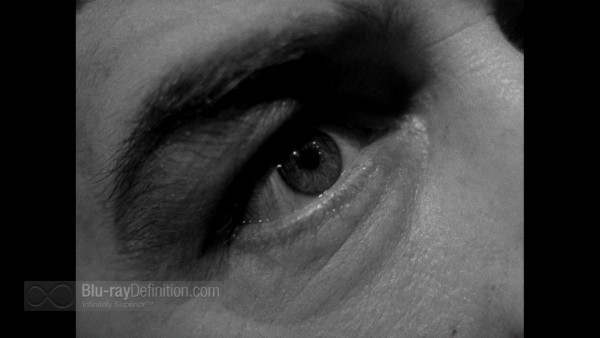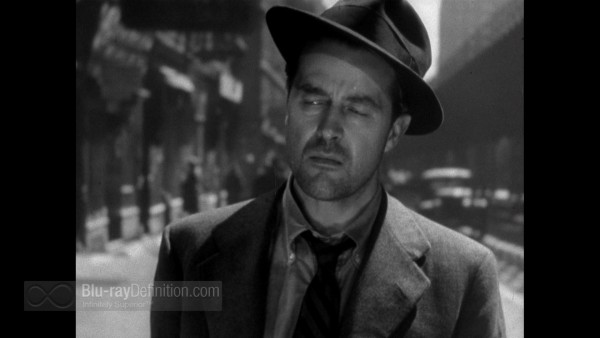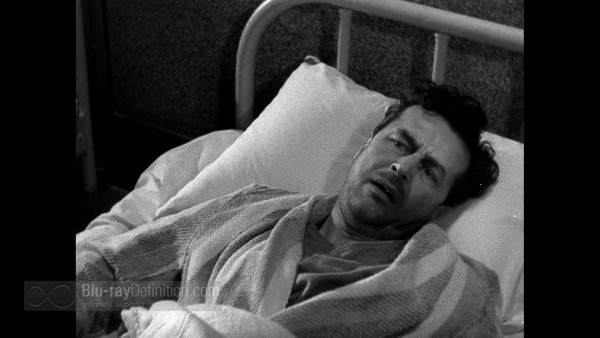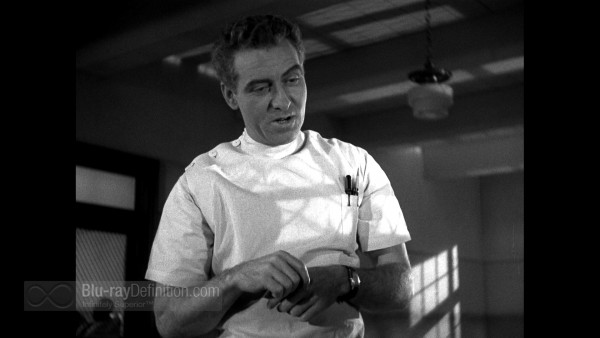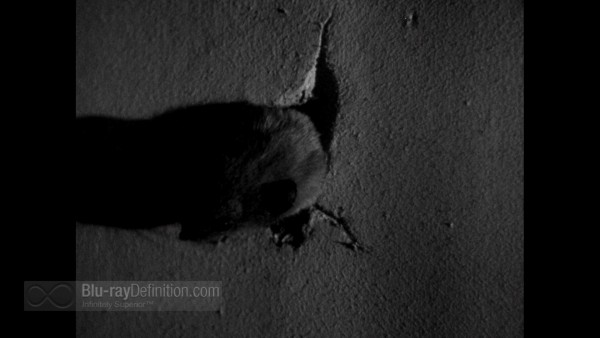- Aspect Ratio: 1.37:1
- Video Codec: AVC/MPEG-4
- Resolution: 1080p/24 (23.976Hz)
- Audio Codec: English DTS-HD Master Audio 2.0 Mono (48kHz/24-bit)
- Subtitles: English SDH
- Subtitles Color: White
- Region: B (Region-Locked)
- Certification: PG
- Discs: 1 (1 x Blu-ray)
- Run time: 101 Mins.
- Studio: Eureka Entertainment/Masters of Cinema
- Blu-ray Release Date: June 25, 2012
- RRP: £20.42; £30.63 (Steelbook)
–
Overall
[Rating:4/5]
The Film
[Rating:4.5/5]
Video Quality
[Rating:4/5]
Audio Quality
[Rating:3/5]
Supplemental Materials
[Rating:3.5/5]
Click thumbnails for high-resolution 1920X1080p screen captures
(All TheaterByte screen captures are lightly compressed with lossy JPEG at 100% quality setting and are meant as a general representation of the content. They do not fully reveal the capabilities of the Blu-ray format)
–
The Film
[Rating:4.5/5]
Billy Wilder’s classic, Oscar-winning (Best Actor; Best Director; Best Picture; Best Screenplay; Best Cinematography/Black and White; Best Editing; Best Score) 1945 film noir, The Lost Weekend, was, not unlike Wilder’s previous film, Double Indemnity, a controversial one for its time. The film was adamantly opposed by the alcohol industry who feared a backlash of new, tougher regulations due to The Lost Weekend’s vivid depiction of alcoholism so close after the repeal of prohibition. It was boycotted by temperance groups, and Wilder himself had to navigate the industry’s own Hays Code of moral standards in film like an obstacle course to bring the gritty drama to the screen.
The film features Ray Milland in the lead role as thirty-something writer, Don Birnam, suffering from writer’s block who is sabotaging not only his career, but his relationship with his brother Wick (Phillip Terry) and beautiful new girlfriend Helen (Jane Wyman) due to his alcohol abuse. Not a film noir in the traditional sense, The Lost Weekend, holds true to the style of the noir in its cinematography (beautifully captured by John F. Seitz), clever language and colorful cast of characters. The “thrill” in this thriller, however, comes from protagonist Don Birnam’s own decent into the depths of desperation as he escalates his lies and even his anti-social behavior all for the ability to keep on drinking. In one scene, just as he determines to finally write his novel, he must go out and drink, goes to cocktail lounge, has his fill, but is unable to pay, causing him to swipe a lady’s purse.
Though surrounded by people who purport to care for him – his brother, his girlfriend, even a worried bartender – it seems that Don is only really surrounded by people enabling him even further. Jane Wyman’s character is an incredibly understanding girlfriend who, at one point, tries to ply him with more drink to keep him from killing himself. Finally Don finds himself temporarily institutionalized, where we meet the film’s most ominous character, a male nurse named Bim (Frank Faylen); a character who hits Don with the ugly truth of his lot as an “alchie” in such matter-of-fact language and detached emotion he seems almost like the villain in this wild plot. This leads to The Lost Weekend‘s most famous sequence, where Don returns home, bottle of rye whiskey in hand, settles down into his drunken stupor and hallucinates a Freudian horror scene implanted in his subconscious by Bim.
The Lost Weekend is or, was, very much worthy of all the accolades lavished upon it. The wonderful cast, no doubt here driven by a powerful performance from Ray Milland and impeccable direction from Billy Wilder, make this noir-ish thriller riveting and very much addictive – no pun intended. The cinematography and often rousing score combine to make a technical achievement that rivals even the best from Hitchcock.
Video Quality
[Rating:4/5]
The 35mm source for The Lost Weekend has aged better than some other films of its era and this AVC/MPEG-4 encodement from Eureka’s Masters of Cinema series looks quite fine given the vintage. While there is some variance in contrast and grain density that remains and some other source damage can be detected such as dust and scratches, overall this is a fine transfer that looks film-like. There is a good amount of detail in the close-up shots, even if it tends to roll off rather quickly moving further into the backgrounds in some of the scenes.
Audio Quality
[Rating:3/5]
The original monaural soundtrack is provided in DTS-HD Master Audio 2.0 (48kHz/24-bit). Although the sound is predictably boxy with a rather narrow range of dynamics, it is clean with little pops, clicks, hiss or crackle and offers intelligible dialogue.
Supplemental Materials
[Rating:3.5/5]
As per usual, this Masters of Cinema release is flush with strong, high quality continent all relevant to the release and informative.
- Alex Cox Introduction (1.78:1; 1080p/24; 00:06:36)
- Billy, How Did You Do It? (1.33:1; 1080p/24; 03:03:16) – These extensive interviews with Billy Wilder – conducted by director Volker Schlöndorff – have been shown in numerous versions in several countries. This three-part presentation originally screened in the UK as part of the BBC’s Arena strand over three consecutive nights in January 1992.
- The Screen Guild Theater (00:30:01) – This radio adaptation of The Lost Weekend was broadcast on 7 January 1946, and features Ray Milland, Jane Wyman, and Frankie Faylen in their original screen roles.
- Theatrical Trailer (1.33:1; 1080p/24)
- Booklet: The 36-page illustrated booklet features an introspective essay on the film by David Cairns titled simply “The Lost Weekend” that seeks less to explain the production of the film than to give a possible interpretation of some of The Lost Weekend‘s more illusive symbolism. “Novel, Screenplay, Film” explores the famous hallucination scene with script and original novel excerpts, frame-by-frame comparison of the scene and some historical reference. Finally, there is The House of Seagram Congratulates Ray Milland, a public service ad campaign launched by the Seagram company in responsive to the depiction of alcoholism in the film The Lost Weekend.
The Definitive Word
Overall:
[Rating:4/5]
Eureka’s Masters of Cinema have a winner here with this Billy Wilder noir classic, The Lost Weekend. Lovingly transferred to Blu-ray, the powerful story, superb acting and marvelous black and white visuals make it a must for film buffs.
Additional Screen Captures
[amazon-product region=”uk” tracking_id=”bluraydefinit-21″]B007196V1U[/amazon-product]
[amazon-product region=”uk” tracking_id=”bluraydefinit-21″]B007196V24[/amazon-product]
Shop for more Blu-ray titles at Amazon.co.uk
–
[amazon-product region=”uk” tracking_id=”bluraydefinit-21″]B007196V24[/amazon-product]
[amazon-product region=”uk” tracking_id=”bluraydefinit-21″]B007196V1U[/amazon-product]
Shop for more Blu-ray titles at Amazon.co.uk
Overall
[Rating:4/5]
The Film
[Rating:4.5/5]
Video Quality
[Rating:4/5]
Audio Quality
[Rating:3/5]
Supplemental Materials
[Rating:3.5/5]


